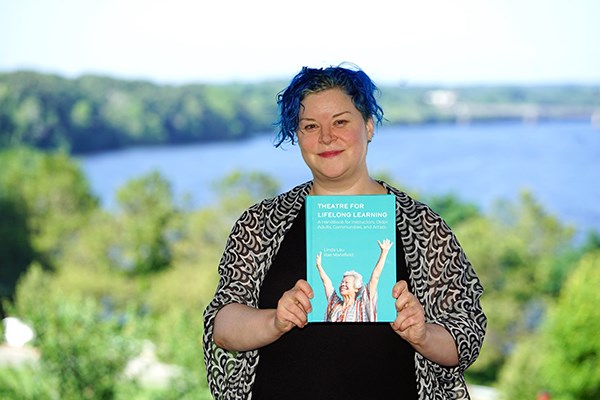Honors College’s Rae Mansfield Co-Authors ‘Theatre for Lifelong Learning’
 Image by Ed Brennen
Image by Ed Brennen
Rae Mansfield of the Honors College co-wrote "Theatre for Lifelong Learning," a guide for teaching and creating theater with older adults. Mansfield plans to infuse the First Year Seminar in Honors with elements of theater this fall.
08/25/2023
By Ed Brennen
Rae Mansfield, associate director for honors scholarship and curriculum, believes in the power of theater performance to engage students – of any major – through collaboration and creativity.
Mansfield knows from experience, however, that students from outside the theatre arts program can cringe at the idea of jumping up in front of the class and performing a one-act play.
“You have to couch it very carefully, because you will see an immediate aversion when you say, ‘We’re going to do theater in this history class!’” Mansfield says. “But doing theater for higher education does work; it is transferable.”
Mansfield has some expertise in teaching theater to non-theater types. Mansfield recently co-authored “Theatre for Lifelong Learning,” a guide for teaching and creating theater with older adults.
“There is so much about theater – being present, collaborating and interacting with others – that is beneficial, especially for older populations,” Mansfield says. “It helps with memory. It helps with loneliness.”
Mansfield co-wrote the book with Linda Lau, whom they met about 15 years ago at Tufts University while they were both pursuing doctorates in drama. They kept in touch over the years, and in 2017 they began writing plays together.
They both had experience working with older adults – Mansfield at Tufts’ Osher Lifelong Learning Institute and Lau at Santa Rosa Junior College in California – and in 2019, they were asked to write an article for the academic journal “Theatre Topics” on best practices for working with older adults in theater. That sparked the idea for their own Theatre for Lifelong Learning website, which features interviews with artists, improvisation exercises and short plays available for free download.
“We were writing plays just for fun, but my problem is that I make things into work. I’m that person,” says Lau, who suggested they turn their work into a book, which they wrote during the first four months of the pandemic in 2020. It was released last November.
They have also created theater and improv resources specifically for higher education, which Mansfield plans to implement this fall with Honors College students taking the First Year Seminar in Honors.
Mansfield says the biggest challenge for college students is being in the moment.
“Our typical college-age students tend to either be very focused on the past or thinking about things that are far in the future,” Mansfield says.
Mansfield also plans to introduce the curriculum to the Learning in Retirement Association (LIRA), which offers educational courses and social events for retired and semi-retired people in collaboration with the university’s Community Relations and Alumni Relations offices.
While Mansfield and Lau can see turning Theatre for Lifelong Learning into a nonprofit organization someday, they are content with it being a side project for now.
“Part of the success of this project is that we don’t expect to make money from it,” Lau says. “Once you have that pressure, it’s a lot less fun.”
They have begun collaborating on a new project, however. The topic? Collaboration.
